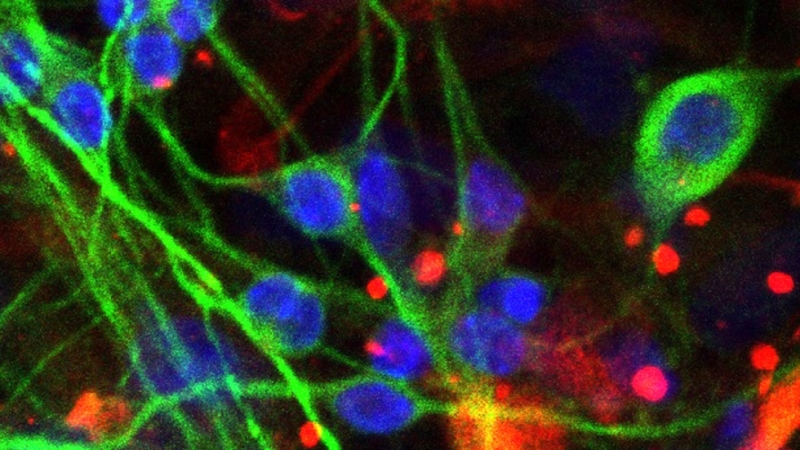
Young-Pearse and colleagues studied human astrocytes (red) and neurons (green) derived from iPS cells. Photo courtesy of Sarah Sullivan.
Study of plaque production holds promise for improved treatments
By B.D. Colen, HSCI Director of Communications
Building on research they reported last year, Harvard Stem Cell Institute researchers at Brigham and Women’s Hospital have succeeded in identifying the neurons that secrete the substance responsible for the plaques that build up in the brains of Alzheimer’s disease patients.
The work has been published in the Journal of Neuroscience.
Focusing on the form of the disease found in early onset Alzheimer’s – the two percent of patients who develop the progressive dementia before age 65, Tracy Young-Pearse and colleagues say that now “we can examine amyloid beta secretion at the single cell level, and better understand the responses of individual cells to drugs. I think that could be very valuable” in developing treatments, said HSCI’s Young-Pearse, Harvard Medical School assistant professor.
Young-Pearse said that her team’s latest work, carried out in collaboration with J. Christopher Love, of MIT’s Koch Institute for Integrative Cancer Research is an example of both the latest advances in, and import of, the ability to study disease processes on the level of individual cells.
“We didn’t have the ability to do this until recently,” Young-Pearse explained. “The amount of heterogeneity between two cells that you think are the same can actually be huge. There are incredible differences between cell types. And we finally have to ability to look at those differences on the single cell level,” she said.
“Chris Love developed this great system for looking at individual immune system cells: such as B cells and T cells,” Young-Pearse said, and “he helped us apply his system to neuroscience. I’m really excited about being able to apply this to neurological disease.”
Both the miniaturization, and scale, of the research system are mind boggling: a single slide has 86,000 wells in it, each of which holds a single cell for analysis.
This research was supported by the National Institutes of Health, Harvard Stem Cell Institute, the W.M. Keck Foundation, and the Koch Institute.
